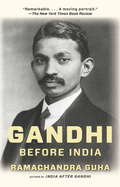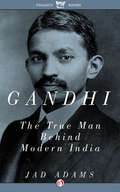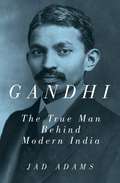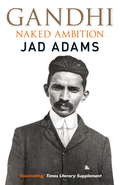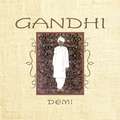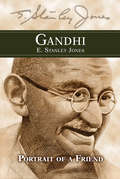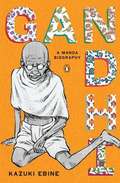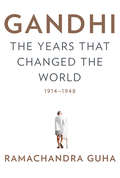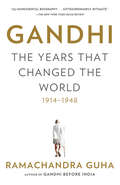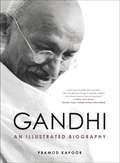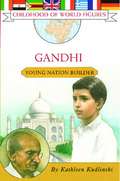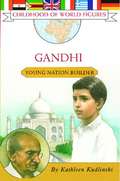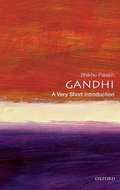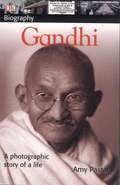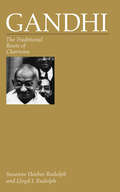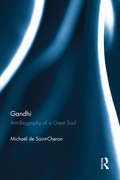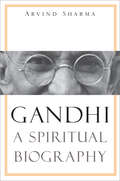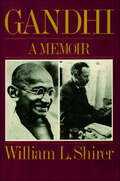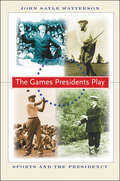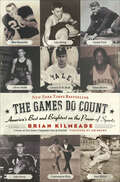- Table View
- List View
Gandhi Bharat Se Pahle: गांधी भारत से पहले
by Ramchandra Guha1893 में, जब मोहनदास गांधी ने दक्षिण अफ्रीका के लिए समुद्री यात्रा की, वह एक संक्षिप्त वकील थे जो भारत में खुद को स्थापित करने में विफल रहे थे। इस उल्लेखनीय जीवनी में, रामचंद्र गुहा का तर्क है कि गांधी ने डायस्पोरा में जो दो दशक बिताए, वे महात्मा के निर्माण थे। यहीं पर उन्होंने उस दर्शन और तकनीक को गढ़ा जो अंततः ब्रिटिश साम्राज्य को नष्ट कर देगा। चार महाद्वीपों में अभिलेखीय शोध के आधार पर, यह पुस्तक असंतुष्ट पंथों के साथ गांधी के प्रयोगों, उनकी दोस्ती और दुश्मनी और एक पति और पिता के रूप में उनकी विफलताओं की पड़ताल करती है। गांधी भारत से पहले कहानी बताती है कि कैसे उन्होंने एक क्रॉस-क्लास और अंतर-धार्मिक गठबंधन को लामबंद किया, एक नस्लवादी शासन के खिलाफ उनकी लड़ाई में अहिंसा का संकल्प लिया। गहन शोध और खूबसूरती से लिखी गई यह पुस्तक आधुनिक भारत के महानतम व्यक्ति के बारे में हमारी समझ और प्रशंसा को मौलिक रूप से बदल देगी।
Gandhi Before India
by Ramachandra GuhaThe first volume of a magisterial biography: the definitive portrait of the life and work of one of the most abidingly influential--and controversial--men in modern history. Here is a revelatory work of biography that takes us from Gandhi's birth in 1869 through his upbringing in Gujarat, his 2 years as a student in London, and his 2 decades as a lawyer and community organizer in South Africa. Ramachandra Guha has uncovered a myriad of previously untapped documents, including: private papers of Gandhi's contemporaries and co-workers; contemporary newspapers and court documents; the writings of Gandhi's children; secret files kept by British Empire functionaries. Using this wealth of material in a brilliantly nuanced narrative, Guha describes the social, political and personal worlds in which Gandhi began his journey to become the modern era's most important and influential political actor. And Guha makes clear that Gandhi's work in South Africa--far from being a mere prelude to his accomplishments in India--was profoundly influential on his evolution as a political thinker, social reformer and beloved leader.
Gandhi and Marx
by K. G. MashruwalaWhat can be a more fascinating study to us in the present age than that of a comparison between the ideologies of Gandhi, the great soul (mahatma), and Marx, the great thinker (mahamuni)? If the last hundred years or so of the social life of humanity were boiled away, the residue will most likely be these two great names. Lenin is ingested in Marx. And the shadow of Tolstoy spreads over Gandhi. The two ideologies stand face to face, each bent on swallowing up the other. — VINOBA
Gandhi
by Jad Adams"Provocative. Adams strips away Gandhi's saintly aura and explores the duality . . . of India's most famous leader." --Financial Times Jad Adams traces the course of Gandhi's multi-faceted life, and the development of his religious, political, and social thinking over seven tumultuous decades: from his comfortable upbringing in a princely state in Gujarat; his early civil rights campaigns; his leadership through civil disobedience in the 1920s and 1930s that made him a world icon; and finally to his assassination by a Hindu extremist in 1948, only months after the birth of independent India. An elegant and masterly account of one of the seminal figures of twentieth-century history, Adams presents for the first time the true story behind the man whose life may truly be said to have changed the world.
Gandhi: The True Man Behind Modern India
by Jad Adams"Provocative. Adams strips away Gandhi's saintly aura and explores the duality of India's most famous leader."--Financial Times Jad Adams traces the course of Gandhi's multi-faceted life and the development of his religious, political, and social thinking over seven tumultuous decades: from his comfortable upbringing in a princely state in Gujarat; his early civil rights campaigns; his leadership through civil disobedience in the 1920s and 1930s that made him a world icon; and finally to his assassination by a Hindu extremist in 1948, only months after the birth of an independent India. An elegant and masterly account of one of the seminal figures of twentieth-century history, Adams presents for the first time the true story behind the man whose life may truly be said to have changed the world.
Gandhi: Naked Ambition
by Jad AdamsThe pre-eminent political and spiritual leader of India's independence movement, pioneer of non-violent resistance through mass civil disobedience, and the man honoured in India as 'father of the nation', Mohandas K. Gandhi has inspired civil rights and liberation movements the world over.Yet he was also a man of many contradictions: a lifelong pacifist whose treatment of his wife and sons bordered on cruelty; a self-denying ascetic who preached the virtues of chastity in marriage yet experienced a high degree of intimate physical female contact; a political radical whose resistance to racism and appreciation of the value of all religions strike a thoroughly modern note, but whose vision of India was of an almost medieval village nation.In Gandhi: Naked Ambition, Jad Adams delineates Gandhi's searing ambition, including his relentless recreation of his own image, from London dandy to naked wise man; his ruthless sacrifice of his family for his principles; and his role in the tragedy of partition.Using material only recently made available, including the most explicit account yet of Gandhi's sexual experiments with the wives of his followers and his teenage grand-nieces, Jad Adams' accessible and challenging biography reveals the man behind the Mahatma.
Gandhi
by DemiM.k.Gandhi known by his followers as Mahatama--or great soul--was born in India in 1869 and grew up to become one of the most influential and well-respected political and social leaders the world has ever known. An adamant idealist and a courageous thinker, Gandhi identified himself with the struggles of the common people. He won independence for India and is called "Father of India". Nelson Mandela and Martin Luther King were followers of Gandhi's teachings.
Gandhi: Portrait of a Friend
by E Stanley Jones Foundation"On the day that Mahatma Gandhi was killed, I arrived in Delhi just an hour and a quarter before the tragedy ... the greatest tragedy since the Son of God died on the cross." So begins this compelling account of Gandhi by E. Stanley Jones, the world-renowned missionary evangelist to India during 40 seething years of struggle. Based on an intimate knowledge and understanding, Jones's revealing interpretation was written in gratitude to Gandhi, who, although they often disagreed, showed Jones "more of the spirit of Christ than perhaps any other . . . in East or West." "Martin Luther King, Jr., told me he owed a debt to my father for his book on Mahatma Gandhi. He had read many books on Gandhi, read his writings, but it was that particular book of my father's that had triggered his decision to use the method of ... nonviolence in his civil rights movement for his people." --Eunice Jones Mathews "Highly recommended."--Library Journal "To understand the meaning of this great leader ... read this book of interpretation."--Kirkus "Jones ... possesses a great gift of sympathetically interpreting the East to the West."--[London] Times Literary Supplement
Gandhi
by Kazuki EbineThe life of a true twentieth-century hero told in a vibrant graphic novel format. Through his quietly powerful leadership and influential use of nonviolent resistance in India's struggle against the British Raj, Mahatma Gandhi became one of the most revered figures of the modern era. While history has recorded Gandhi's words and deeds, the man himself has been eclipsed by maxims of virtuosity that seem to have little resonance in our everyday lives. In Gandhi, the third volume in our exciting new manga biography series, created in conjunction with Emotional Content, Kazuki Ebine combines a gripping narrative with stunning illustrations to share Gandhi's inspiring and deeply human story with a whole new generation of readers. Developed in conjunction with Emotional Content. .
Gandhi: The Years That Changed The World, 1914-1948
by Ramachandra GuhaAn epic and revelatory biography of one of the most abidingly influential--and controversial--men in modern history.Opening with Gandhi's triumphant return to India in 1915 after decades abroad, and ending with his tragic assassination in 1949, Gandhi: The Years that Changed the World is a remarkable, moving portrait that provides a crucial re-evaluation of India's iconic leader for a new generation. <p><p> Drawing on a wealth of newly uncovered materials unavailable to previous biographers, acclaimed historian and author Ramachandra Guha brings the past to life with extraordinary grace and clarity. Deploying his gifts as a storyteller and scholar, Guha presents Gandhi as both a fascinating human being--a man of fierce hope, eccentric personal beliefs, and sometimes dark and alarming contradictions--as well as a dynamic political force and global icon. <p> Sharp, insightful, balanced, and impeccably researched, this free-standing sequel to Guha's magisterial biography Gandhi Before India is an indispensable resource for a contemporary understanding of Gandhi's ever-evolving legacy.
Gandhi: The Years That Changed The World, 1914-1948
by Ramachandra GuhaThe second and concluding volume of the magisterial biography that began with the acclaimed, Gandhi Before India: the definitive portrait of the life and work of one of the most abidingly influential--and controversial--men in world history. <p><p> This volume opens with Mohandas Gandhi's arrival in Bombay in January 1915 and takes us through his epic struggles over the next three decades: to deliver India from British rule, to forge harmonious relations between India's Hindu and Muslim populations, to end the pernicious Hindu practice of untouchability, and to develop India's economic and moral self-reliance. We see how in each of these campaigns, Gandhi adapted methods of nonviolence--strikes, marches, fasts--that successfully challenged British authority, religious orthodoxy, social customs, and would influence non-violent, revolutionary movements throughout the world. <p> In reconstructing Gandhi's life and work, Ramachandra Guha has drawn on sixty different archival collections, the most significant among them, a previously unavailable collection of papers belonging to Gandhi himself. <p> Using this wealth of material, Guha creates a portrait of Gandhi and of those closest to him--family, friends, political and social leaders--that illuminates the complexity inside his thinking, his motives, his actions and their outcomes as he engaged with every important aspect of social and public life in the India of his time.
Gandhi: An Illustrated Biography
by Pramod KapoorRarely seen images and rigorous research provides fascinating insight into one of the most revered figures in modern Indian history. Gandhi is an intimate history of the evolution of a mischievous, fun-loving boy into the Mahatma. From his schooling and early marriage in Kathiawar to his first brushes with the grandeur of London; from his chance employment for a legal case in South Africa to a train ride in Pietermaritzburg that led to his first fight for equality; from a relatively unsuccessful lawyer to a globally celebrated crusader for human rights-Gandhi was that rare rebel who redefined the meaning of mass resistance for generation to come. The chronological text and rarely seen photographs bring out his unique complexities for a new generation of readers.
Gandhi: Young Nation Builder
by Kathleen KudlinskiA childhood biography of the great political and social leader.Mohandas K. Gandhi (1869-1948) studied law in England, then spent 20 years defending the rights of immigrants in South Africa. In 1914 he returned to India and became the leader of the Indian National Congress. Gandhi urged non-violence and civil disobedience as a means to independence from Great Britain, with public acts of defiance that landed him in jail several times. In 1947 he participated in the postwar negotiations that led to Indian independence. He was shot to death by a Hindu fanatic in 1948. This childhood biography highlights the events that informed Gandhi's indomitable spirit.
Gandhi
by Kathleen KudlinskiThe man we remember simply as Gandhi was born Mohandas Gandhi in India in 1869. From an early age he was made keenly aware of the rigid Hindu caste system of his country, and was heavily influenced by his mother's ability to fast as a way to control her urges. Mohandas was married at the age of thirteen and continued his education, though he struggled as a student. He also struggled to find himself and to keep his moral center intact. At college in London, and then later at work in South Africa and India, Gandhi was appalled at the abject poverty he discovered and by the widespread denial of civil liberties and political rights he encountered. He ultimately dedicated his life to the struggle for fundamental human rights for all Indians. Read all about the fascinating early years and eventual accomplishments of this inspiring leader.
Gandhi: Young Nation Builder (Childhood of Famous Americans Series)
by Kathleen V. KudlinskiThis book narrates the fascinating early years and eventual accomplishments of the inspiring leader, Mahatma Gandhi, who is known as the Father of the Nation of India.
Gandhi: A Very Short Introduction
by Bhikhu ParekhMohandas Karamchand Gandhi (1869-1948) was one of the few men in history to fight simultaneously on moral, religious, political, social, economic, and cultural fronts. During his time as a lawyer in South Africa he developed his strategy of non-violence: the idea of opposing unjust laws by non-violent protest. He led the Indian National Congress party in three major campaigns against British rule, each culminating in his arrest. In Gandhi, a short introduction to Gandhi's life and thought, Bhikhu Parekh outlines both Gandhi's major philosophical insights and the limitations of his thought. Written with extensive access to Gandhi's writings in Indian languages to which most commentators have little or no access, Parekh looks at Gandhi's cosmocentric anthropology, his spiritual view of politics, and his theories of oppression, non-violent action, and active citizenship. He also considers how the success of Gandhi's principles were limited by his lack of coherent theories of evil, and of state and power. Gandhi's view of man as ascetic allows no room for expressions of the cultural, artistic, or intellectual. Furthermore, he was so hostile to modern civilization that he was unable to appreciate its complex dialectic or offer a meaningful narrative. Nevertheless, Gandhi's life and thought had an enormous impact on the Indian nation, and he continues to be widely revered--known before and after his assassination as Mahatma, the Great Soul.
Gandhi: 'Hind Swaraj' and Other Writings
by Anthony J. ParelHind Swaraj is Mahatma Gandhi's fundamental work. Not only is it key to understanding his life and thoughts, but also the politics of South Asia in the first half of the twentieth century. Celebrating 100 years since Hind Swaraj was first published in a newspaper, this centenary edition includes a new preface and editor's introduction, as well as a new chapter on 'Gandhi and the 'Canonical aims of life''. The volume presents a critical edition of the 1910 text of Hind Swaraj, fully annotated and including Gandhi's own Preface and Foreword (not found in other editions). Anthony J. Parel sets the work in its historical and political contexts and analyses the significance of Gandhi's experiences in England and South Africa. The second part of the volume contains some of Gandhi's other writings, including his correspondence with Tolstoy and Nehru.
Gandhi: The Traditional Roots of Charisma
by Susanne Hoeber Rudolph Lloyd I. RudolphThe Rudolphs' analysis reveals that Gandhi's charisma was deeply rooted in the aspects of Indian tradition that he interpreted for his time. They key to his political influence was his ability to realize in both his daily life and his public actions, cultural ideals that many Indians honored but could not enact themselves—ideals such as the traditional Hindu belief that a person's capacity for self-control enhances his capacity to control his environment. Appealing to shared expectations and recognitions, Gandhi was able to revitalize tradition while simultaneously breaking with some of its entrenched values, practices, and interests. One result was a self-critical, ethical, and inclusive nationalist movement that eventually led to independence.
Gandhi: Anti-Biography of a Great Soul
by Michaël de Saint-CheronThis book is not just another biography of Gandhi. It is valuable because it offers us a French view--- and Jewish too perhaps---- of a man and times so familiar to us and yet which acquires another dimension as it is represented through another culture. There are eloquent accounts in this book of philosophers like Ramakrishna and Vivekananda who influenced Gandhi’s thought and life. Rather than political events, Michaël de Saint-Chéron holds up the force and courage of a man who became a prophet in a blood-thirsty century. Interestingly, the author points out that it is only India and the Middle East which has given the world the two mother religions of Hinduism and Judaism. Neither China nor Europe, two major cultures, have produced a world religion. The book is further enriched by a discussion on Hindu mysticism and the concept of ‘love’ in Judaism. The author also looks at how Gandhi has played a major role on shaping French intellectuals such as Andre Malraux. At the end however, a central dilemma, and a painful one to the work, concerns Gandhi’s silence on the Holocaust. This book will be of interest to scholars working on Gandhian studies, Indian philosophy and Judaism, and to readers of politics, ethics and history.
Gandhi: A Spiritual Biography
by Arvind SharmaIn his Autobiography, Gandhi wrote, "What I want to achieve--what I have been striving and pining to achieve these thirty years--is self-realization, to see God face to face. . . . All that I do by way of speaking and writing, and all my ventures in the political field, are directed to this same end." While hundreds of biographies and histories have been written about Gandhi (1869-1948), nearly all of them have focused on the political, social, or familial dimensions of his life. Very few, in recounting how Gandhi led his country to political freedom, have viewed his struggle primarily as a search for spiritual liberation.Shifting the focus to the understudied subject of Gandhi's spiritual life, Arvind Sharma retells the story of Gandhi's life through this lens. Illuminating unsuspected dimensions of Gandhi's inner world and uncovering their surprising connections with his outward actions, Sharma explores the eclectic religious atmosphere in which Gandhi was raised, his belief in reincarnation, his conviction that morality and religion are synonymous, his attitudes toward tyranny and freedom, and, perhaps most important, the mysterious source of his power to establish new norms of human conduct. This book enlarges our understanding of one of history's most profoundly influential figures, a man whose trust in the power of the soul helped liberate millions.
Gandhi: A Memoir
by William L. ShirerRecalling his friendship and conversations with the late Indian leader, William Shirer presents a portrait of Gandhi that spotlights his frailties as well as his accomplishments.As a young foreign correspondent, William Shirer reported briefly on Gandhi—but the year was 1931, when India's struggle for independence peaked and Gandhi scored perhaps his greatest political success. The year before, he had led a 200-mile march to the sea to pick up a lump of salt—a violation of the British salt tax; and this symbolic act (like—he reminds Shirer—the Boston Tea Party) had propelled the Indian masses into nonviolent civil disobedience on a large scale. To check its spread, Gandhi had been arbitrarily imprisoned. Now he was out of prison and negotiating with the British viceroy: if Gandhi would call off the civil-disobedience campaign and attend an upcoming London conference, the British would make concessions too.These, however, were so limited and vague that many Indian nationalists regarded Gandhi's agreement as a sell-out; but Shirer underlines history's judgment of its wisdom with Gandhi's own words. More importantly, he notes, the British had finally been forced "to deal with an Indian leader as an equal." Along these lines, Shirer also witnessed British discomfiture at Gandhi's arrival—complete with loin cloth, spinning wheel, and goat’s milk; he saw the sensation Gandhi caused in London—and heard him address Lancashire millhands thrown out of work by the Indian boycott of British cotton. And he saw him at home, subsisting on four-hours' sleep and "frenzied acclaim." This book is sure to press upon readers the worldwide force of Gandhi's example.—Kirkus Reviews
The Games Presidents Play: Sports and the Presidency
by John Sayle WattersonThe Games Presidents Play provides a new way to view the American presidency. Looking at the athletic strengths, feats, and shortcomings of our presidents, John Sayle Watterson explores not only their health, physical attributes, personalities, and sports IQs, but also the increasing trend of Americans in the past century to equate sporting achievements with courage, manliness, and political competence.The author of College Football begins with George Washington, whose athleticism contributed to his success on the battlefield and may well have contributed to the birth of the republic. He moves seamlessly into the nineteenth century when, for presidents like Jackson, Lincoln, and Cleveland, frontier sports were part of their formative years. With the twentieth-century presidents—most notably the hyperactive and headline-grabbing Theodore Roosevelt—Watterson shows how the growth of mass media and the improved means of transportation transformed presidential sports into both a form of recreation and a means of establishing a positive self-image.Modern presidents have used sports with varying degrees of success. Herbert Hoover fled Washington on weekends to the trout pools of Camp Rapidan in the Blue Ridge to escape relentless pressures and public criticism during the Great Depression. Franklin Roosevelt demonstrated remarkable physical endurance in his campaign to restore his ravaged body from polio. An obsessive love affair with golf became an issue for Dwight Eisenhower in his campaign for reelection in 1956. Richard Nixon, a former third-string college football lineman, placed calls to Coach George Allen of the Washington Redskins, once suggesting a trick play in a big game.From the opening pitch of the baseball season to presenting awards to Olympic champions, our sports culture asks the president to play an increasingly active role. Sports, Watterson argues, open a window into the presidency, shedding new light on presidential behavior and offering new perspectives on the office and the sporting men—and women—who have and will occupy it.
The Games Presidents Play: Sports and the Presidency
by John Sayle WattersonThis look at the connections between sportsmanship and statesmanship “introduces an intriguing way of evaluating presidential fitness for office” (Richmond Times-Dispatch).Whether throwing out the first pitch of the baseball season, fishing for trout, or cheating at golf, American presidents through history have had connections to the world of sports in many ways. This book explores how various commanders-in-chief worked and played—and how their athletic activities reflected their political identities.The author considers George Washington, whose athleticism contributed to his success on the battlefield and perhaps to the birth of the republic. He moves into the nineteenth century, when frontier sports were part of the formative years of Jackson, Lincoln, and Cleveland. With twentieth-century presidents—most notably the hyperactive, headline-grabbing Teddy Roosevelt—he shows how the growth of mass media and transportation transformed presidential sports into both a form of recreation and a means of establishing a positive image. Exploring everything from FDR’s fight to restore his polio-ravaged body to Eisenhower’s obsessive love affair with golf to Nixon’s enthusiasm for football, this book uses sports to open a window onto the presidency and the nation’s culture, as well as the strengths, weaknesses, and personalities of America’s leaders.“Watterson’s history rises above trivia in its attention to the political ramifications of presidents’ sports while also being a consistently entertaining trove of lore and, as the author puts it, ‘just weird stuff,’ such as John Q. Adams granting an interview while skinny-dipping. A wry and perceptive work.” —Booklist “An enjoyable study of politics and culture.” —Publishers Weekly“Will appeal to history buffs and sports fans alike.” —Library Journal
The Games Do Count: America's Best and Brightest on the Power of Sports
by Brian KilmeadeWhat do Henry Kissinger, Jack Welch, Condoleezza Rice, and Jon Bon Jovi have in common? They have all reached the top of their respective professions, and they all credit sports for teaching them the lessons that were fundamental to their success. In his years spent interviewing and profiling celebrities, politicians, and top businesspeople, popular sportscaster and Fox & Friends cohost Brian Kilmeade has discovered that nearly everyone shares a love of sports and has a story about how a game, a coach, or a single moment of competition changed his or her life.These vignettes have entertained, surprised, and inspired readers nationwide with their insight into America's most respected and well-known personalities. Kilmeade presents more than seventy stories straight from the men and women themselves and those who were closest to them. From competition to camaraderie, individual achievement to teamwork, failure to success, the world of sports encompasses it all and enriches our lives. The Games Do Count reveals this simple and compelling truth: America's best and brightest haven't just worked hard -- they've played hard -- and the results have been staggering!

